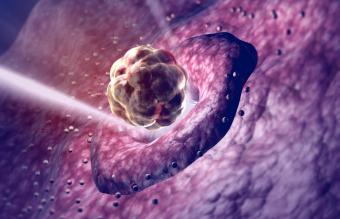
Constipation is one of the most common bowel complaints in pregnancy according to the American Congress of Obstetricians and Gynecologists. It usually can be relieved by simple changes in diet and other habits or with over-the-counter laxatives. Check with your doctor first before using any medicines during pregnancy.
Causes
The causes of constipation during pregnancy are rarely of major health concern. Some of the causes can occur in or out of pregnancy but others are associated with the changes that come with pregnancy. According to reviews by the American College of Gastroenterology and the journal Gastroenterology and Hepatology, common causes of constipation during pregnancy include:
- A change in diet, mainly eating less fiber
- Drinking less fluids
- Decreased physical activity
- Increased absorption of water from intestines
- Iron supplements and calcium in prenatal vitamins
- The increase in progesterone hormone is thought make bowels sluggish by relaxing the bowel muscle wall
- Long-term overuse of laxatives for constipation prior to pregnancy, which can weaken bowel muscles and slow bowel activity
- Hemorrhoids may make it painful to pass stool and prevent you from going to the bathroom frequently
- A habit of holding stool and not going when the urge comes
- Hypothyroidism
- Diabetes mellitus
Difficulty with constipation may increase as pregnancy progresses into the third trimester and the growing uterus compresses the bowel. Constipation may become especially problematic near term as the baby descends into the pelvis and presses on the large bowel and rectum.
Prevention and First Line Remedies
You can prevent constipation or get relief from it before the problem worsens by paying attention to your diet and increasing your physical activities as long as your doctor approves the activity. Many women will get relief by taking the following simple steps:
- Increase fiber in your daily diet by eating more fruits, vegetables, legumes or whole grain cereals.
- Increase your fluid intake, including water and unsweetened drinks.
- Drink one to two glasses of prune juice a day until you get relief.
- Increase your physical activity such as walking and swimming may improve bowel activity.
- Empty your bowels as soon as you feel the need; don't hold it until it becomes hard.
- Talk to your doctor about changing your iron and vitamin supplements to options less constipating.
Laxative Options

If a change in your diet and other habits don't work, laxatives can be helpful. According to a 2010 review in Clinics in Colon and Rectal Surgery few laxatives have been studied for use in pregnancy but most are considered safe. Most of them carry a Food and Drug Administration (FDA) pregnancy category B or C. according to Current Gastroenterology Reports. As with any other medicines during pregnancy, even if considered safe, check with your doctor before using any laxatives.
Of the available options, osmotic, stimulant and lubricants laxatives should be considered only if first line remedies and bulking agents don't work because of potential adverse and side effects.
Bulking Agents
Bulk-forming agents dissolve and swell in your bowels and lubricant the stool so it passes through easier and quicker. They are an effective next step and the safest laxatives to use if first-line changes don't help. They are not absorbed from the gut, are considered safe and do not carry an FDA pregnancy category. Side effects include gas, bloating and cramping.
Products include Metamucil (psyllium), Citrucel (methylcellulose) and FiberCon (polycarbofil).
Osmotic agents
Osmotic agents appear to be safe for use during pregnancy but should only be used if your doctor advices them and only for the short term. If used frequently, they may cause electrolyte imbalances or dehydration. They draw water and increases pressure in the gut and eases passage of stool. They can cause bowel gas, cramping and bloating,
Osmotic laxatives include salts such as Milk of Magnesia, Magnesium Citrate and other agents such as sorbitol, lactulose and Miralax (propylene glycol, PEG).
Stimulants
Stimulant laxatives are considered safe during pregnancy and are more effective than bulking agents but should only be used if doctor recommends them and only for a short while. They may cause dehydration and electrolyte imbalances and bowel cramps. They act by stimulating bowel wall muscle activity to propel stool along and by decreasing water absorption in the large bowel to leave stool softer.
Products include Ex-Lax or Senekot (senna), Nature's Remedy (cascara), and Dulcolax or Correctol (bisacodyl), available in oral form or as a suppository or enema.
Stool Softeners
Stool softeners (emollients) allow water to be drawn into the stool so it softens and it passes through the gut easier. These are not thought to be very effective in treating constipation so check with your doctor before using. Options include Colace (docusate sodium).
Avoid
Lubricants
Lubricants soften stool by preventing loss of water and lubricating it. They are not recommended for use during pregnancy because of adverse effects. Options include:
- Mineral oil should not be used during pregnancy because it interferes with absorption of vitamins from the gut. If you are taking blood thinners during your pregnancy, poor absorption of vitamin K could cause your blood to thin too much and cause bleeding. Your baby may also not get enough vitamin K.
- Castor oil is also not recommended in pregnancy because it may cause premature contractions.
In addition to mineral and castor oils, avoid using enemas or rectal suppositories to treat constipation during pregnancy unless ordered by your doctor. Also avoid "natural" herbal preparations because there is no way to tell if they contain ingredients that may be toxic to you or your baby.
When to Consult Your Doctor
Constipation is rarely caused by a major medical illness during pregnancy but consult with your doctor if you notice the following:
- Moderate to severe persistent abdominal pain after moving your bowels
- You don't move your bowels for a week
- Persistent constipation despite first and second line remedies
- Persistent rectal pain
- Blood in your stool
- Weight loss
For most women, constipation can be prevented or relieved during pregnancy by a few simple changes in daily habits or with safe laxatives that your doctor can advise for short term use.







